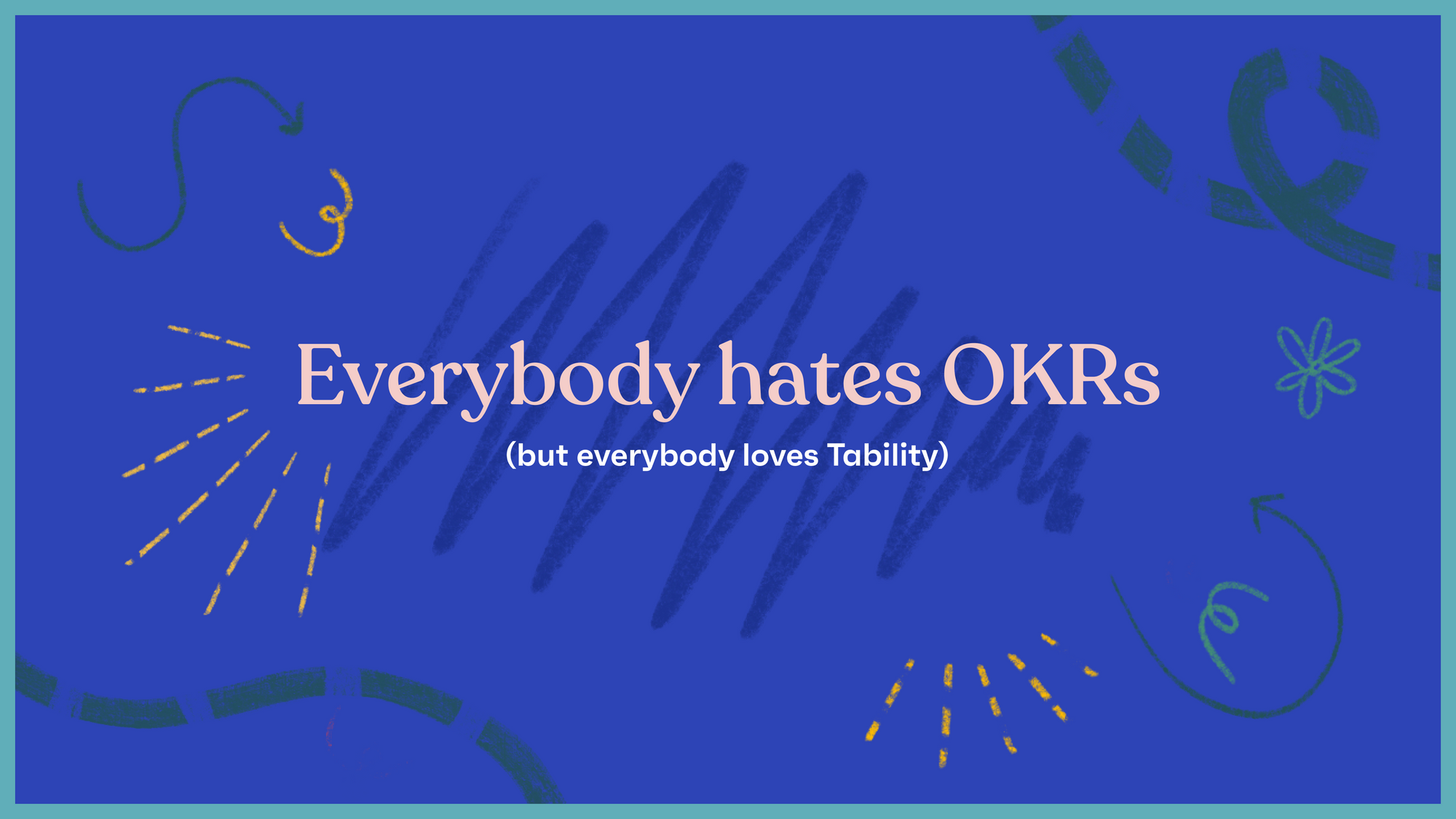Everybody Hates OKRs
OKRs are designed for managers and CEOs. But it takes more than an eager leader to make OKRs work across an org. Our mission with Tability is to redesign OKRs to be for the team first, and get the love and adoption from the bottom up.

Everybody hates OKRs, but everybody loves Tability 😇
This is one of our design objectives this quarter. We’re not saying that OKRs suck, or that they are not effective. It’s more of an acknowledgement that, for a lot of people, OKRs are not enjoyable and seem a bit extra. What we want to do with Tability is to make OKRs enjoyable and useful to everybody — not just your manager.
Maybe not everybody hates OKRs. Your manager probably loves OKRs.
There aren't many designers, engineers or content writers out there thinking "I wish our team did OKRs". The probability is much higher that the person googling “What are Objectives and Key Results” is in a position of leadership. They’re often the first ones to feel the pain of having to sync multiple teams, and a goal-setting framework comes as a blessing. But to make OKRs work, you're going to have to involve the rest of the team.
Now, I say this understanding the irony of it: I'm a co-founder of an app that tracks OKRs, and I rejected OKRs in my last job 😅
I was a brand and marketing designer and I didn't see how goals would improve my workflow. How is it going to benefit ME? Why do I need to create goals and objectives when I don't even know what will be thrown on my desk tomorrow. Why do I need to update these goals when I'm just trying to knock off the next ticket or task.
I ignored my OKRs at the time, and it never came up again.
Making OKRs for everybody
Our team at the time wasn't ready for OKRs, nor was it introduced in a structured, productive way. We weren't an outlier in that. The adoption of OKRs can be difficult and met with a lot of friction.
This is where "Everybody hates OKRs, but everybody loves Tability" comes in.
So how do we help teams to adopt OKRs? It takes a collaboration between managers (those who implement the framework and see/want the reports from their team) and contributors (the team members who are assigned goals and updating them).
What a manager wants:
- A clear direction so the team knows what to work on
- Updates on progress so they understand where they need to adjust
- A clear report to show their managers or other teams what they are accomplishing
What a contributor wants:
- Clear direction on what they should be working on
- They don't want to do admin work that takes them away from their tasks
- Feel empowered, not micromanaged
Easier said than done. Quite often the manager needs are considered but it isn't something that the contributor level team members are seeking out. In a perfect world, OKRs should be great for everybody. They give clarity to your company's direction. They help you measure success in a meaningful and precise way. They help empower your team because they can see directly how their work moves the needle. So in an imperfect world, how can we achieve the same results?
How we plan to get there
We're launching a new version of Tability (call it 2.0) to simplify a complex problem, and make OKRs feel like an easy and healthy routine rather than tedious work.
Bring strategy and work together into one ritual
OKRs don't need to be this over the top process. The key questions we want to answer:
- How do we effectively strategize and plan?
- How do we measure that success efficiently?
- How does our strategy inform what we need to work on this week?
We don't need to implement a OKR process on top of our current work process if the two can integrate into one another.
Highlight everybody's contribution to the whole
One issue with OKRs is that it often feels like it’s used to hammer the team when things are getting off-track. Of course, you’d want to take care of issues early, but we believe that it’s just as important to celebrate victories.
So we also think about the questions that a contributor might have:
- What should I be focused on?
- Is my work visible to the rest of the org?
- Is my work appreciated?
Be the heartbeat of the company
It's all about alignment and transparency.
- Is there a single place you can go to see what's going on with your company?
- Are we accomplishing our company goals?
- What are your co-workers working on?
As the workforce becomes more remote and more distributed, we have less water cooler conversations. Having a single source to check in on your company and what everyone is working on is going to be even more useful.
Try Tability today
You can try Tability for free today. You get your first 25 check-ins on us and you'll be able to jump start your OKRs with our simple goal setting and goal tracking app.
Still got questions? Schedule a free demo 👋
As usual, let us know what you think and how we can help you with your team strategy 📬 team@tability.io or join us in our thriving Community Slack room 💬!

